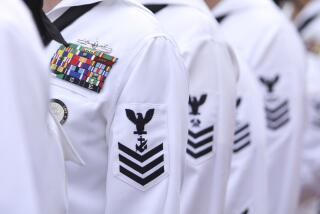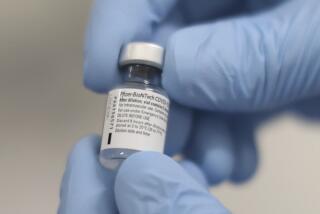Major AIDS-Related Study Launched in S.D. : Medicine: Research at new Hillcrest facility will focus on the effect HIV virus has on 410 subjects.
- Share via
UC San Diego’s Medical Center, the U.S. Navy and the Veteran’s Administration on Thursday unveiled a unique, federally funded facility that researchers will use to determine how the virus that causes AIDS affects the nervous system.
A wide-ranging team of medical researchers, including virologists, neurologists, psychologists and psychiatrists, will study the impact that human immunodeficiency virus, or HIV, has on the nervous systems of 290 HIV-positive volunteers from the Navy and Marine Corps and 120 HIV-positive civilians who live in San Diego County.
In addition to “basic biological responses,” researchers will study the impact that important “life events” have on the subjects, Dr. J. Hampton Atkinson, co-director of the HIV Neurobehavioral Research Center in Hillcrest said Thursday.
The five-year study, funded by a $19.5-million grant from the National Institutes of Mental Health, is designed to determine if HIV-positive individuals can delay neurological impairment such as loss of memory.
The study will help determine if “healthy coping mechanisms and social support groups . . . (can slow) the rate of progression from infection with HIV, to symptoms of HIV, to full-blown AIDS,” Atkinson said. “We’d like to identify if people who cope poorly are more likely to become sicker faster, or develop central nervous system problems.”
“If some brain impairment begins at a relatively early stage, and treatments can be commenced that will delay it, we want to know about it,” Atkinson said.
The Navy has been pressing for a neurological impact study since the mid-1980s, when it became apparent that the Armed Forces would one day have a relatively large number of HIV-infected people. The Navy hopes to learn when HIV-positive individuals should be withdrawn from jobs that “could endanger themselves or others,” said Capt. James Chandler, chairman of the psychiatry department at the Naval Hospital in Balboa Park. “There is a direct military implication,” he said.
Navy personnel who test positive for HIV are typically reassigned to bases near large Navy hospitals in Balboa Park and three other U.S. locations that conduct HIV screening. After evaluation, some naval personnel are “reassigned to limited duty,” Chandler said.
Many members of that HIV-infected population have remained in San Diego on active duty or after accepting medical discharges, Chandler said.
The Navy’s strong involvement in the research program is important, Chandler said, because the Armed Forces have been testing personnel for HIV since 1984. That testing program has generated a “unique population for whom the timing of (HIV) infection is fairly well established,” Chandler said.
Because that population’s infection dates are fairly well documented, researchers can more accurately track HIV’s impact on the nervous system, Chandler said. It is difficult to determine when most people were infected with HIV, so the Navy population is “an important resource,” Atkinson said.
During coming years, researchers will use a wide array of tests to learn what occurs to volunteers’ nervous systems. Researchers will use high-tech Magnetic Resonance Imaging devices to gain detailed images of volunteers’ brains. They will also will draw samples of the fluid that bathes the brain and spinal cord, and chart how fast nerves conduct electrical impulses.
Because some volunteers will die before the five-year study ends, participants are being asked to agree to a “special autopsy . . . (that will) carefully examine the brain and other tissues” to better understand HIV’s impact on infected individuals.
The study is still seeking participants. Interested volunteers can call 543-5000.





